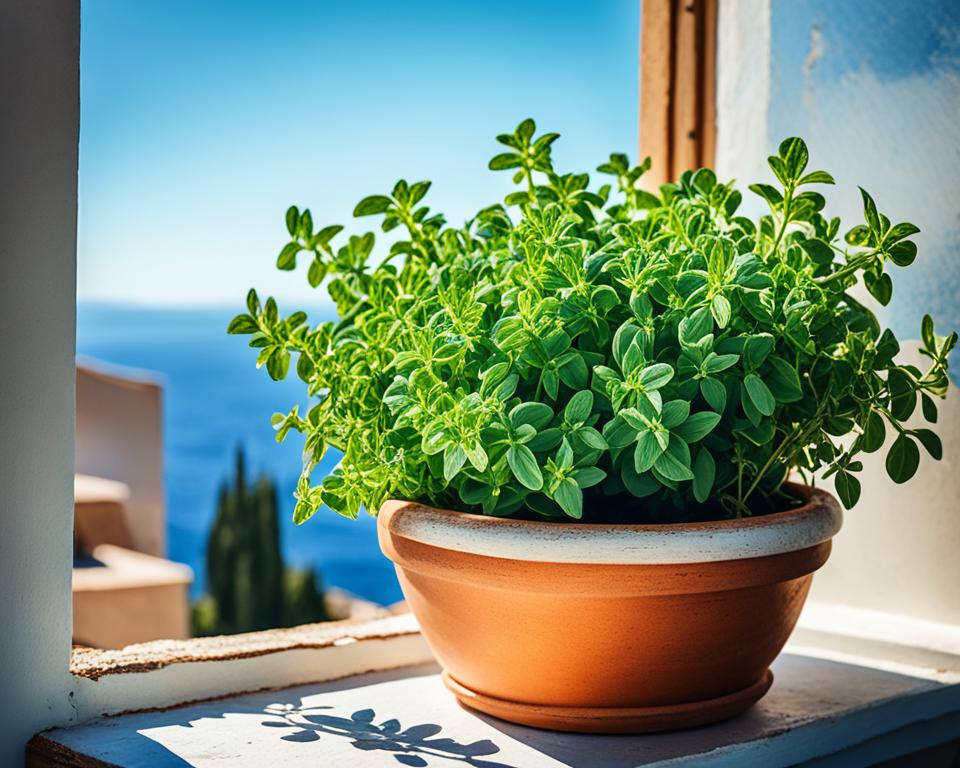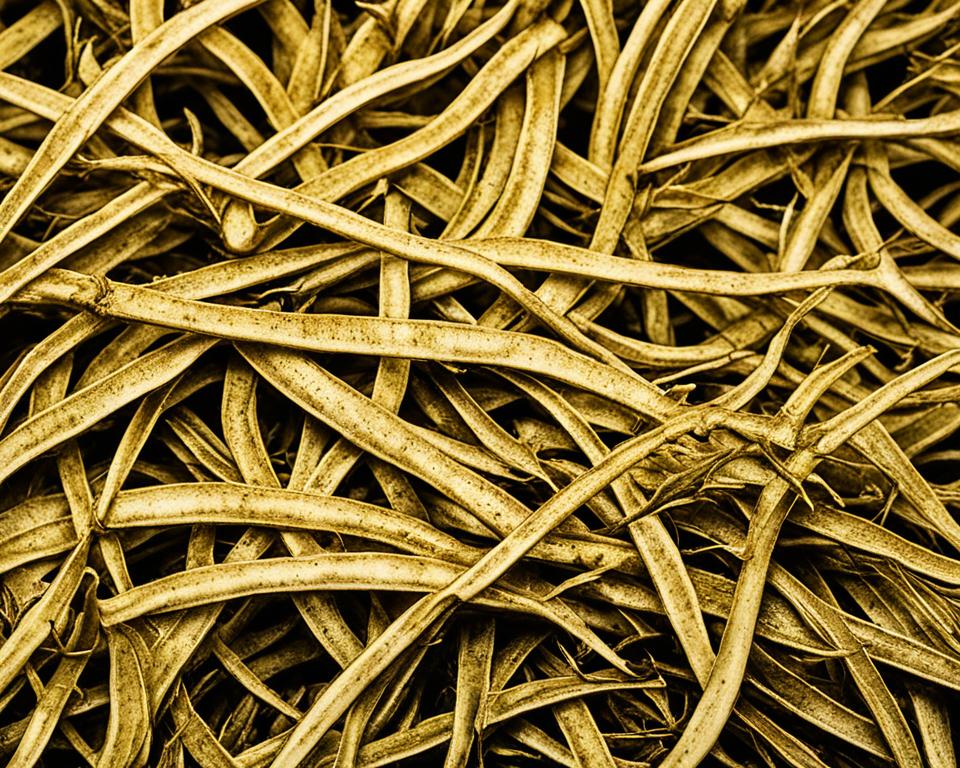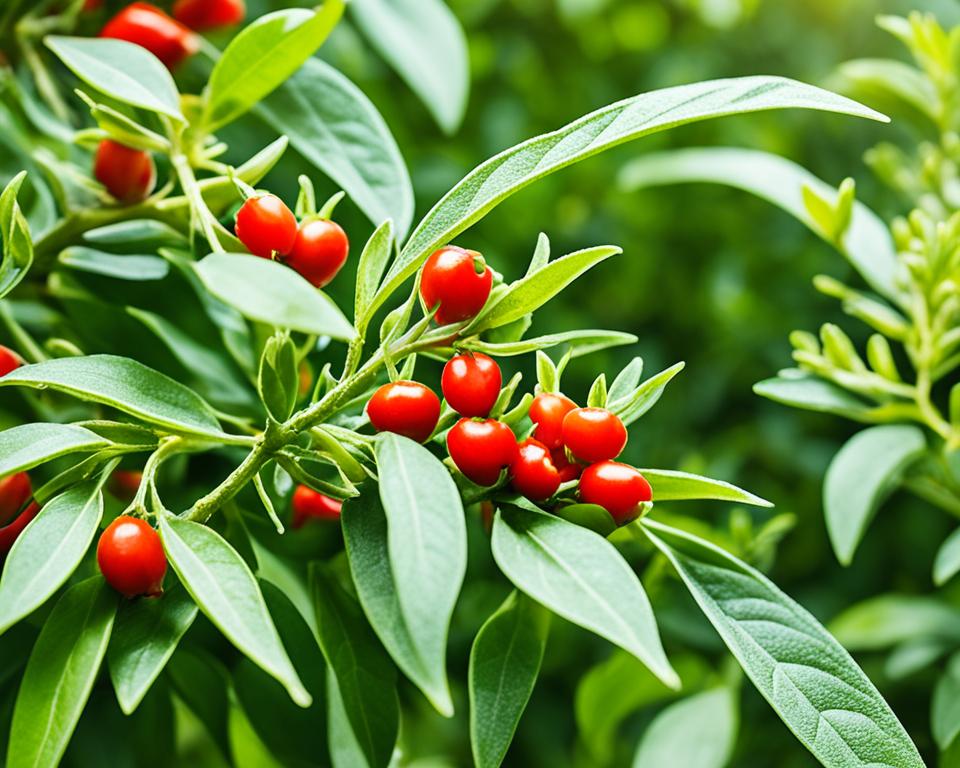Greek oregano, also known as Origanum vulgare subsp. hirtum, is a revered culinary herb that has been a staple in Mediterranean cuisine for centuries. Originating from the mountainous regions of Greece, this aromatic plant has become synonymous with the flavors of the Mediterranean, prized for its distinct earthy aroma and robust, slightly peppery taste. With its antioxidant-rich properties and versatility in cooking, Greek oregano has earned its place as an essential ingredient in a wide range of dishes, from classic Italian pizza to hearty Greek stews. This article explores the origins, characteristics, and culinary applications of this authentic Mediterranean herb, offering insights into its rich history and the reasons why it remains a cherished ingredient in kitchens around the world.
Read interesting things at : tosawakan
Key Takeaways
- Greek oregano is a revered culinary herb with a distinct earthy aroma and robust, peppery taste.
- It has been a staple in Mediterranean cuisine for centuries, originating from the mountainous regions of Greece.
- Greek oregano is prized for its antioxidant-rich properties and versatility in cooking, used in a wide range of dishes.
- This authentic Mediterranean herb is synonymous with the flavors of the region and remains a cherished ingredient in kitchens worldwide.
- The article explores the origins, characteristics, and culinary applications of Greek oregano, offering insights into its rich history and enduring popularity.
Introduction to Greek Oregano
Greek oregano has a long and storied history, deeply rooted in the Mediterranean region. The plant, botanically known as Origanum vulgare subsp. hirtum, is a member of the Lamiaceae family and is closely related to the common oregano found in many cuisines. However, Greek oregano is distinguished by its unique growing conditions and distinct flavor profile, which sets it apart from other oregano varieties.
Origins and History
Originating from the mountainous regions of Greece, Greek oregano has been a cherished culinary herb in the Mediterranean for centuries. The herb’s use can be traced back to ancient Greek and Roman civilizations, where it was prized not only for its aromatic properties but also for its medicinal and religious applications.
Botanical Characteristics
Origanum vulgare subsp. hirtum, the botanical name for Greek oregano, is a perennial plant that can grow up to 12 inches tall. Its small, oval-shaped leaves are covered in fine hairs, giving the plant a distinctive appearance and contributing to its robust, aromatic character.
Greek Oregano: A Culinary Marvel
Greek oregano has long been revered in the culinary world for its ability to enhance the flavors of traditional Mediterranean cuisine. Its pungent, earthy aroma and slightly peppery taste make it an indispensable culinary seasoning in a wide range of iconic recipes, from classic Italian dishes like pizza and pasta sauces to hearty Greek stews and roasted meats.
Enhancing Flavors in Mediterranean Cuisine
The robust and aromatic properties of Greek oregano make it a versatile ingredient that can elevate the flavors of numerous Mediterranean dishes. Whether sprinkled over tomato-based sauces, incorporated into marinades, or used as a finishing touch, this flavorful herb has the power to transform the taste profile of a meal, adding depth and complexity to the overall culinary experience.
Versatility in Cooking
Beyond its traditional applications in Mediterranean cuisine, Greek oregano has also found a place in modern culinary creations, showcasing its remarkable versatility in cooking. From pizza toppings to roasted vegetables, soups, and even baked goods, this aromatic herb can be used to enhance a wide variety of dishes, making it a must-have flavor enhancement in any well-stocked kitchen.
Distinguishing Greek Oregano
While Greek oregano and common oregano (Origanum vulgare) may appear similar at first glance, they are distinctly different in their flavor profiles and culinary applications. The key difference lies in the specific subspecies of Origanum vulgare that Greek oregano belongs to, Origanum vulgare subsp. hirtum, which imparts a more intense, earthy aroma and a slightly more robust, peppery taste compared to the milder common oregano.
Difference from Common Oregano
The distinct flavor profile of Greek oregano sets it apart from its more widely known counterpart, common oregano. While both herbs belong to the Origanum genus, the specific subspecies that defines Greek oregano results in a more pronounced and intense aroma and taste. This culinary distinction makes Greek oregano a prized ingredient in Mediterranean cuisine, where its robust, peppery notes are highly sought after.
Superior Aroma and Taste
The superior aroma and taste of Greek oregano can be attributed to its unique growing conditions and the specific chemical compounds present in the plant. The herb’s earthy, slightly pungent flavor is highly prized by chefs and home cooks alike, making it an indispensable ingredient in a wide range of Mediterranean dishes, from classic Italian pizza to flavorful Greek stews.
| Characteristic | Greek Oregano | Common Oregano |
|---|---|---|
| Botanical Subspecies | Origanum vulgare subsp. hirtum | Origanum vulgare |
| Aroma | Intense, earthy | Milder, less pronounced |
| Taste | Robust, peppery | Milder, more subtle |
| Culinary Applications | Highly prized in Mediterranean cuisine | Widely used in various cuisines |
Cultivation and Harvesting
Greek oregano, with its deep roots in the Mediterranean region, thrives in the warm, sunny climate and well-drained soils of this picturesque landscape. The greek oregano plant prefers full sun exposure and thrives in areas with moderate temperatures and low to moderate humidity levels. It is a perennial herb that can grow up to 12 inches tall, with small, oval-shaped leaves that are covered in fine hairs, giving the plant a distinct textural appearance.
Growing Conditions
The cultivation of greek oregano in the Mediterranean region has been a time-honored tradition, passed down through generations of growers. The herb flourishes in the region’s warm, Mediterranean climate, which provides the ideal growing conditions for this aromatic plant. With its preference for well-drained soils and abundant sunshine, greek oregano thrives in the rugged, mountainous terrain that characterizes much of the Mediterranean landscape.
Traditional Harvesting Methods
Harvesting greek oregano is a delicate and time-honored process that has been perfected over centuries of cultivation in the Mediterranean region. Traditional methods often involve carefully hand-picking the herb’s leaves and flowers during the peak of the growing season, typically mid-to-late summer. This meticulous approach ensures that the greek oregano retains its signature flavor and aroma, making it a prized ingredient in the rich tapestry of Mediterranean cuisine.
Greek Oregano
Greek oregano, botanically known as Origanum vulgare subsp. hirtum, is a beloved culinary herb that has been a staple in Mediterranean cuisine for centuries. Originating from the mountainous regions of Greece, this aromatic plant is prized for its distinct earthy aroma and robust, slightly peppery taste, which sets it apart from common oregano (Origanum vulgare).
This culinary herb has become synonymous with the flavors of the Mediterranean, and its versatility in the kitchen has made it an indispensable ingredient in a wide range of traditional dishes from the region. Whether as a seasoning for savory meats, a key component in classic Mediterranean cuisine recipes, or a fragrant addition to bread and pizza, Greek oregano has earned its place as a cherished ingredient in kitchens around the world.
With its rich history, distinct flavor profile, and enduring cultural significance, Greek oregano continues to captivate both seasoned cooks and enthusiastic home chefs alike, solidifying its status as a true culinary marvel in the diverse and flavorful world of Mediterranean cuisine.
Nutritional Profile and Benefits
In addition to its exceptional culinary qualities, Greek oregano is also prized for its nutritional profile and potential health benefits. The herb is rich in antioxidants, including phenolic compounds like rosmarinic acid and carvacrol, which have been linked to various health-promoting properties.
Antioxidant Properties
The antioxidant compounds found in Greek oregano are believed to play a crucial role in supporting overall health. These compounds, such as rosmarinic acid and carvacrol, have demonstrated the ability to neutralize harmful free radicals and reduce oxidative stress, which can contribute to the development of various chronic diseases.
Potential Health Benefits
Emerging research suggests that the health benefits of Greek oregano may extend beyond its antioxidant properties. Studies have indicated that the herb may possess anti-inflammatory, antimicrobial, and even potential anti-cancer properties, making it a valuable culinary herb with potential therapeutic applications.
| Nutrient | Amount per Serving |
|---|---|
| Calories | 5 calories |
| Total Fat | 0.1 g |
| Carbohydrates | 1 g |
| Fiber | 0.7 g |
| Protein | 0.1 g |
| Vitamin K | 8 μg |
| Vitamin A | 125 IU |
| Vitamin C | 1.2 mg |
| Iron | 0.4 mg |
Greek Oregano in Mediterranean Cuisine
Greek oregano is truly at home in the rich and flavorful world of Mediterranean cuisine, where it has been a cherished ingredient for centuries. The herb’s robust, earthy flavor profile makes it an indispensable component in a wide range of iconic dishes from the region.
Iconic Dishes and Recipes
From the classic pizza Margherita of Italy to the hearty moussaka of Greece, Greek oregano is a fundamental ingredient that elevates the flavors of these beloved Mediterranean specialties. Its pungent aroma and slightly peppery taste perfectly complement the tomato-based sauces, grilled meats, and roasted vegetables that are hallmarks of Mediterranean cuisine.
In traditional Greek souvlaki, skewered and grilled meat is seasoned with a blend of Greek oregano, lemon, and garlic, creating a mouthwatering combination of flavors. Similarly, Greek salads are often garnished with a sprinkle of the fragrant herb, providing a freshness that balances the richness of feta cheese and ripe tomatoes.
Beyond savory dishes, Greek oregano also finds its way into sweet preparations, such as the classic baklava, where it lends a subtle, earthy note that complements the honey and nuts. The herb’s versatility allows it to seamlessly integrate into a wide range of Mediterranean culinary applications, from sauces and marinades to breads and pastries.
Whether used as a primary seasoning or as a supporting player, Greek oregano is undoubtedly a cornerstone of Mediterranean cuisine, adding depth, complexity, and authenticity to some of the region’s most iconic and beloved dishes.
Preserving and Storing Greek Oregano
To maintain the exceptional flavor and aroma of Greek oregano, proper preservation and storage techniques are essential. The most common method of preserving Greek oregano is through drying, which allows the culinary herb to be enjoyed year-round.
Drying Techniques
One of the traditional and effective ways to preserve the essence of Greek oregano is by drying the herb. Growers and enthusiasts often hang bunches of freshly harvested Greek oregano in a warm, dry, and well-ventilated area, allowing the leaves to gradually lose their moisture content. This slow-drying process helps to lock in the herb’s robust, earthy flavor and pungent aroma. Alternatively, Greek oregano can be spread out on clean, dry surfaces, such as baking sheets, and placed in a low-temperature oven or dehydrator to achieve a similar result.
Proper Storage Methods
Once the Greek oregano has been properly dried, it’s essential to store it in an airtight container to maintain its freshness and flavor. Glass jars or resealable plastic bags work well, as they help to prevent the herb from absorbing moisture and losing its potency. It’s recommended to store the dried Greek oregano in a cool, dark place, such as a pantry or spice cabinet, to further enhance its preservation. Proper storage can help ensure that the culinary herb retains its exceptional qualities for extended periods, allowing you to enjoy the authentic flavors of the Mediterranean all year round.
Buying and Sourcing Greek Oregano
When it comes to purchasing Greek oregano, it’s important to know what to look for to ensure you’re getting the highest-quality product. Authentic Greek oregano can be found in specialty spice shops, Mediterranean grocery stores, and online retailers, though it’s important to be discerning when making your selection.
Identifying Quality Oregano
To identify quality Greek oregano, look for leaves that are a vibrant green color with a strong, earthy aroma. The leaves should be intact and free from blemishes or discoloration. Avoid oregano that appears faded, dry, or crumbly, as this may indicate it has been stored improperly or is past its prime.
When purchasing Greek oregano, it’s also important to consider the source and reputation of the seller. Reputable merchants who specialize in culinary herbs are more likely to offer authentic, high-quality Greek oregano that has been properly harvested and handled.
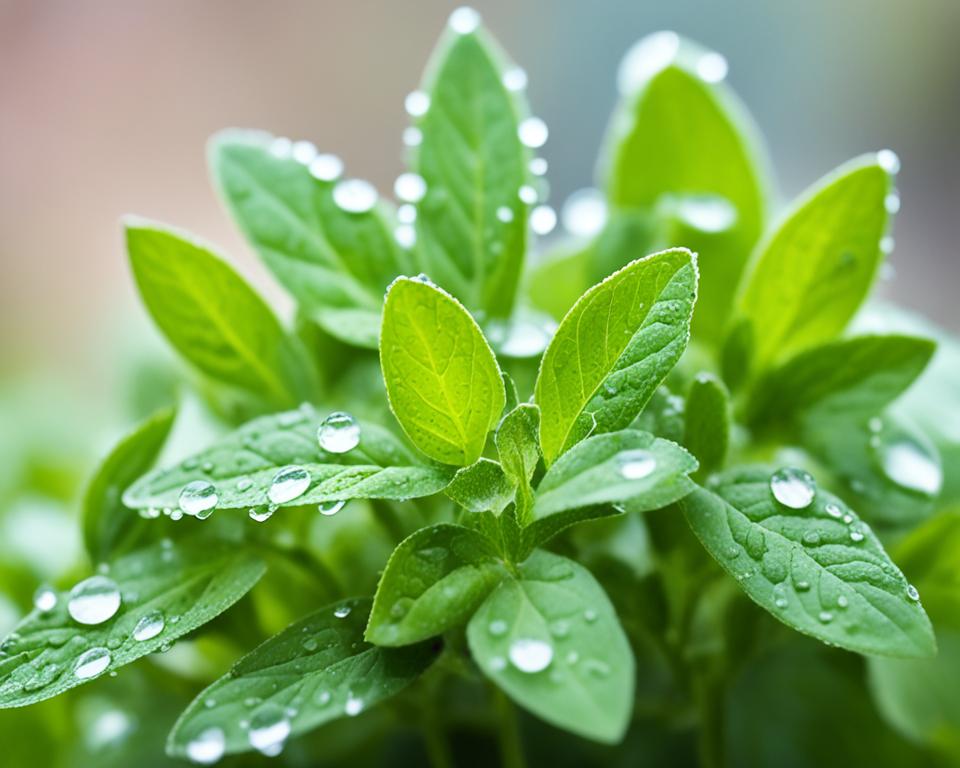
In addition to physical appearance and aroma, you can also assess the flavor of the Greek oregano by rubbing a few leaves between your fingers and taking a whiff. Authentic Greek oregano should have a robust, slightly peppery taste that lingers on the palate, with a distinct earthy and slightly minty undertone.
By taking the time to carefully inspect and source your Greek oregano, you can ensure that you’re getting a high-quality product that will elevate your culinary creations and provide an authentic taste of the Mediterranean.
Greek Oregano in Modern Cooking
While Greek oregano has long been a staple in traditional Mediterranean cuisine, its versatility and exceptional flavor profile have also made it a popular ingredient in modern culinary creations. Chefs and home cooks alike are constantly exploring new and innovative ways to incorporate this aromatic herb into a wide range of dishes.
Innovative Uses and Recipes
Beyond the classic applications of Greek oregano in Mediterranean staples like pizza, pasta, and roasted meats, the herb has found its way into an array of innovative and unexpected recipes. Mixologists have been experimenting with Greek oregano-infused cocktails, adding a unique earthy essence to their creations. Pastry chefs have also embraced the herb, incorporating it into sweet dishes like oregano-infused shortbread cookies and Greek oregano-honey ice cream.
The pungent, slightly peppery notes of Greek oregano also lend themselves well to rubs and marinades for grilled or roasted vegetables, lending a modern twist to classic side dishes. Chefs have been experimenting with Greek oregano in vegetarian and vegan dishes, leveraging its bold flavor to enhance plant-based proteins and create harmonious flavor profiles.
Additionally, Greek oregano has been making its mark in the world of condiments and dips, with the herb being used to infuse everything from olive oil and vinegar to hummus and tzatziki. These versatile applications showcase the herb’s ability to elevate a wide range of culinary creations, from savory to sweet, and from traditional to cutting-edge.
As the demand for unique and flavorful ingredients continues to grow, Greek oregano has firmly established itself as a beloved and indispensable component in the modern cook’s arsenal. Its ability to add depth, complexity, and a touch of the Mediterranean to both classic and innovative dishes has solidified its place in the ever-evolving world of culinary creativity.
Cultural Significance and Traditions
Greek oregano holds a deep and enduring cultural significance in the Mediterranean region, where it has been revered for centuries as a symbol of the region’s rich culinary heritage and traditions. The herb’s roots can be traced back to ancient Greece, where it was used not only in cooking but also in religious and medicinal practices.
In the Mediterranean culture, Greek oregano has long been associated with important cultural events and rituals. It was often used in religious ceremonies, where its aromatic properties were believed to have spiritual significance. Additionally, the herb was an integral part of traditional Mediterranean cuisine, featuring prominently in iconic dishes that have been passed down through generations.
The reverence for Greek oregano extends beyond its culinary applications. In many Mediterranean communities, the herb is considered a symbol of hospitality, often used to welcome guests or to signify the importance of a gathering. Its presence in the home and on the table is a testament to the deep-rooted traditions and cultural significance that Greek oregano holds in this region.
Today, the cultural significance of Greek oregano continues to be celebrated and preserved, with the herb remaining an integral part of the Mediterranean region’s culinary heritage. Its enduring presence in the kitchens and traditions of the Mediterranean people serves as a testament to the timeless appeal and importance of this beloved culinary herb.
Greek Oregano in Herbal Medicine
In addition to its renowned culinary applications, Greek oregano has a long history of use in traditional herbal medicine, with roots dating back to ancient Greek and Mediterranean cultures. The herb has been revered for its potential therapeutic properties and has been incorporated into a variety of traditional remedies.
Traditional Remedies
For centuries, Greek oregano has been utilized in various traditional remedies across the Mediterranean region. The herb has been recognized for its potential medicinal uses and health benefits, leading to its integration into holistic healing practices. From respiratory ailments to skin conditions, Greek oregano has been a go-to ingredient in herbal medicine for generations.
One of the most well-known traditional uses of Greek oregano is in the treatment of respiratory issues, such as coughs, bronchitis, and sinus infections. The herb’s essential oils, rich in compounds like carvacrol and thymol, are believed to possess antiviral and antibacterial properties that can help soothe inflamed airways and promote healing.
Additionally, Greek oregano has been traditionally used to address digestive concerns, including stomach upset, bloating, and diarrhea. The herb’s purported anti-inflammatory and carminative (gas-relieving) properties have made it a popular ingredient in herbal teas and tinctures aimed at maintaining gastrointestinal health.
Beyond its respiratory and digestive applications, Greek oregano has also been incorporated into traditional remedies for skin conditions, such as acne, eczema, and fungal infections. The herb’s antimicrobial and antioxidant compounds are believed to play a role in soothing inflammation and promoting healing in the skin.
While the scientific evidence supporting the specific health benefits of Greek oregano in herbal medicine is still evolving, the herb’s long-standing use in traditional practices highlights its enduring significance in the realm of natural and holistic healing.
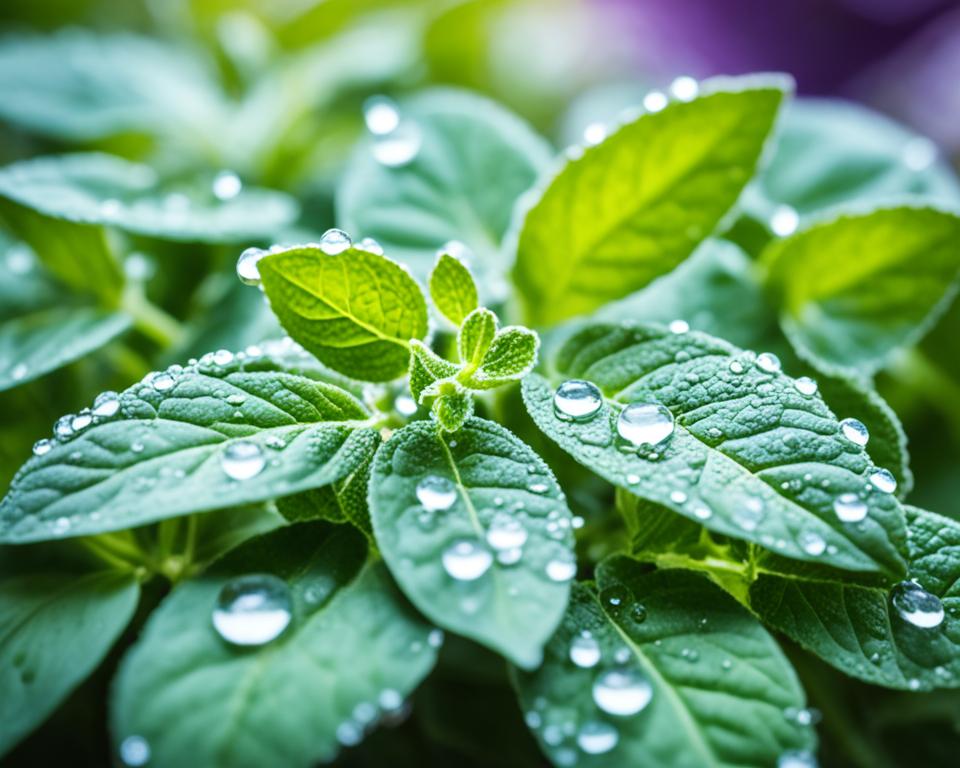
Pairing Greek Oregano with Other Herbs
Greek oregano’s robust and earthy flavor profile pairs exceptionally well with a variety of other herbs and spices commonly used in Mediterranean cuisine. By understanding how to harmonize greek oregano with complementary flavors, cooks can create truly remarkable and harmonious culinary applications.
One of the most classic pairings for greek oregano is fresh basil. The herbaceous and slightly sweet notes of basil perfectly balance the herb pairing and flavor combinations with the oregano’s pungent, slightly peppery undertones. This dynamic duo is the foundation for many iconic Mediterranean dishes, such as tomato-based sauces, greek oregano-infused pizza, and fragrant pesto.
Another excellent match for greek oregano is rosemary, another deeply aromatic herb native to the Mediterranean region. The earthy, pine-like flavors of rosemary complement the greek oregano beautifully, creating a harmonious blend that enhances the culinary applications of roasted meats, vegetables, and even bread.
For a more subtle yet equally impactful herb pairing, greek oregano pairs wonderfully with thyme. The delicate, slightly minty notes of thyme help to temper the intensity of the greek oregano, resulting in a well-balanced flavor profile that shines in stews, marinades, and even Mediterranean-inspired salads.
By exploring the nuanced interplay between greek oregano and other aromatic herbs, cooks can unlock a world of flavor combinations that truly capture the essence of Mediterranean cuisine. The possibilities are endless, making greek oregano a versatile and indispensable ingredient in any well-stocked kitchen.
Sustainability and Environmental Impact
As the global demand for high-quality, authentic greek oregano continues to grow, the sustainability and environmental impact of its cultivation practices in the mediterranean region have become increasingly important considerations. The herb’s deep roots in this distinct geographical area mean that its production is inextricably linked to the delicate ecosystems and traditional farming methods that have been passed down for generations.
Sustainable greek oregano cultivation is not only essential for preserving the unique flavor and aroma that consumers expect, but also for minimizing the herb’s environmental impact. Growers in the mediterranean region have long recognized the importance of adopting eco-friendly practices that protect the land, conserve natural resources, and support the local communities that depend on this valuable crop.
From carefully managing water usage and soil quality to ensuring the responsible use of pesticides and fertilizers, the cultivation of greek oregano in the mediterranean region has evolved to meet the growing demand for sustainable, high-quality ingredients. By prioritizing these environmental and sustainability initiatives, producers of this revered culinary herb are able to maintain the integrity of their products while safeguarding the fragile ecosystems that have nurtured greek oregano for centuries.
Greek Oregano in the Global Market
As the popularity of Mediterranean cuisine has spread worldwide, the demand for authentic Greek oregano has also grown significantly on a global scale. This venerated culinary herb has become a sought-after ingredient, not only in its native region but also in international markets, leading to a thriving export and trade industry.
Export and Trade
Greek oregano, with its distinct aroma and flavor profile, has become a prized commodity in the global marketplace. Countries like Greece, Turkey, and Italy have emerged as major exporters, meeting the increasing international demand for this coveted herb. The export of Greek oregano has become a vital part of the regional economy, with producers and distributors working to ensure a steady supply to meet the global appetite for this essential ingredient in Mediterranean cooking.
The trade of Greek oregano extends far beyond its historical boundaries, with the herb being shipped to culinary hubs around the world. From the bustling markets of New York City to the gourmet kitchens of Tokyo, Greek oregano has established a loyal following among chefs, home cooks, and spice enthusiasts seeking to capture the authentic flavors of the Mediterranean. This global recognition has not only highlighted the herb’s versatility but also its cultural significance, reinforcing its status as a cornerstone of Mediterranean cuisine.
As the demand for Greek oregano continues to rise, producers and exporters in the region are faced with the challenge of maintaining quality, sustainability, and fair trade practices. This has led to increased efforts to educate consumers about the importance of sourcing authentic, high-quality Greek oregano, ensuring that the herb’s unique character and cultural heritage are preserved as it gains a foothold in markets worldwide.






